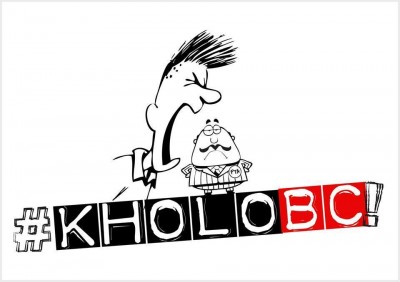
#KholoBC is a Pakistan for All campaign opposed to all forms of state censorship and content regulation on the Internet.
It's been over a year since Pakistanis have had to go without YouTube or resort to proxy servers and VPN services to use the site. The world's most popular video-sharing site has been banned in the country since September 2012 after an anti-Islam film on YouTube, “Innocence of Muslims” sparked protests in many parts of the world.
There has been steady resistance since. This time, unhappy Pakistanis registered their protest in a music video.
#KholoBC, a rap song sung partly in Urdu, partly in English by hip hop and rock singer and comedian Ali Gul Pir and rapper Adil Omar, has gone viral on social media. The tongue-in-cheek music video is part of a youth initiative, Pakistan For All, against Internet censorship in Pakistan. Last year, Pakistan for All released another video to make a noise against the YouTube ban in the country, “If you want me back, hug me“; the YouTube mascot from that video makes an appearance in this one.
Part of the song's success is in it's clever title, “Kholo Ban Chor”. “Kholo” means “open”, “ban” means “ban”, and “chor” means “thief”, so the English translation, “open the ban, you thief” seems more than appropriate to the subject matter. But “ban chor” sounds like another word in Urdu, “bhen chod”, which means “sister-fucker”, and “BC” is a commonly used acronym for the term.
Adil Omar shared on his Facebook page:
Unfortunately Facebook doesn't count video views, but according to insights, #KholoBC has reached 647,521 people on Facebook so far, with over 125,000 active clicks – 14k hits on Vimeo and 5k on YouTube, making it the most viral video in Pakistan so far this week. Let's not stop there. We could make a difference. Keep pushing the video and keep using the #KholoBC hash-tag. State censorship should be fought, and to all in opposition of #KholoBC, or in favor of the YouTube ban, do us a favor and stay the f*ck off YouTube when it's finally opened. www.smarturl.it/KholoBC
Ali Gul Pir, one of the singers of this song tweets:
You cant keep the people of Pakistan in the dark!YouTube ban is political!So the masses dont have a uncensored medium of expression #KholoBC
— Ali Gul Pir (@Aligulpir) February 23, 2014
The video has stirred many conversations on Facebook and Twitter.
M. Omer Khalid tweeted:
Excellent song #kholobc we dont need dharnas we need song like these to get things done @Aligulpir @Adil_Omar #kholobc
— M.Omer Khalid (@MOmerKhalid) February 24, 2014
[Editors note: dharna= protests/demonstrations]
@Zeemayn commented:
This has got to be the most harami song in the history of harami songs #KholoBC https://t.co/sjDPzkbTHu
— couch enthusiast (@zeeemayn) February 24, 2014
[Editors note: Harami = curse word similar in sentiment to asshole, but not in transliteration. Means a really awful person who does unlawful things.]
Aina Syeda didn't find the lyrics funny:
If some1 thinks dat insulting language,race &the name calling in songs is something FUNNY should Consult Doctor ! #waderykabeta #KholoBC
— aina syeda (@SIRF_SACH) February 24, 2014
But Adil Omar had an answer for those who found the language offensive:
Pakistanis in real life: “bhanch*d, madarch*d, cho*t”, but when they hear “kholo ban, chor” in a song: “STOP USING ABUSIVE LANGUAGE!”
— Adil Omar (@Adil_Omar) February 25, 2014
Pakistani writer Bina Shah enjoyed the video:
The best thing about this video, amongst so many others, is the fake news ticker. http://t.co/YCTK8CJ6Yx #KholoBC
— Bina Shah (@BinaShah) February 26, 2014
Atiqa Odha, a Pakistani actress, is mentioned in the lyrics and commented on the video on her Facebook page:
Atiqa Odho is my favorite person on the planet right now. #KholoBC @AliGulPir pic.twitter.com/0tBUyWWO4V
— Adil Omar (@Adil_Omar) February 27, 2014
The video was timely – just two days before the 17th hearing of “Net Freedom Case” dealing with the YouTube ban, pitting ICT organization Bytes for All against the government at the Lahore High Court. The 17th hearing was the first hearing to a larger divisional bench for the case.
Bytes for all shared the update on the case:
The court ordered for the third and last time the Minister for Information and Technology, Ms Anusha Rehman, to appear before the court on Tuesday, 11 March and provide the government's statement and intentions with regard to opening YouTube. Should this not be forthcoming at the next hearing, the Bench would rule on the matter, given that 95% of the content on YouTube is educational.
The IT minister didn't come in the last two hearings. The counsel for the petitioner expressed his reservation that Ms Rehman might go for Umrah once again instead of appearing for the hearing. It has been over a year since this case was filed.
The petition as filed in the court is accessible here.
The feature image used in this post is from the Pakistan for All Facebook page.







6 comments